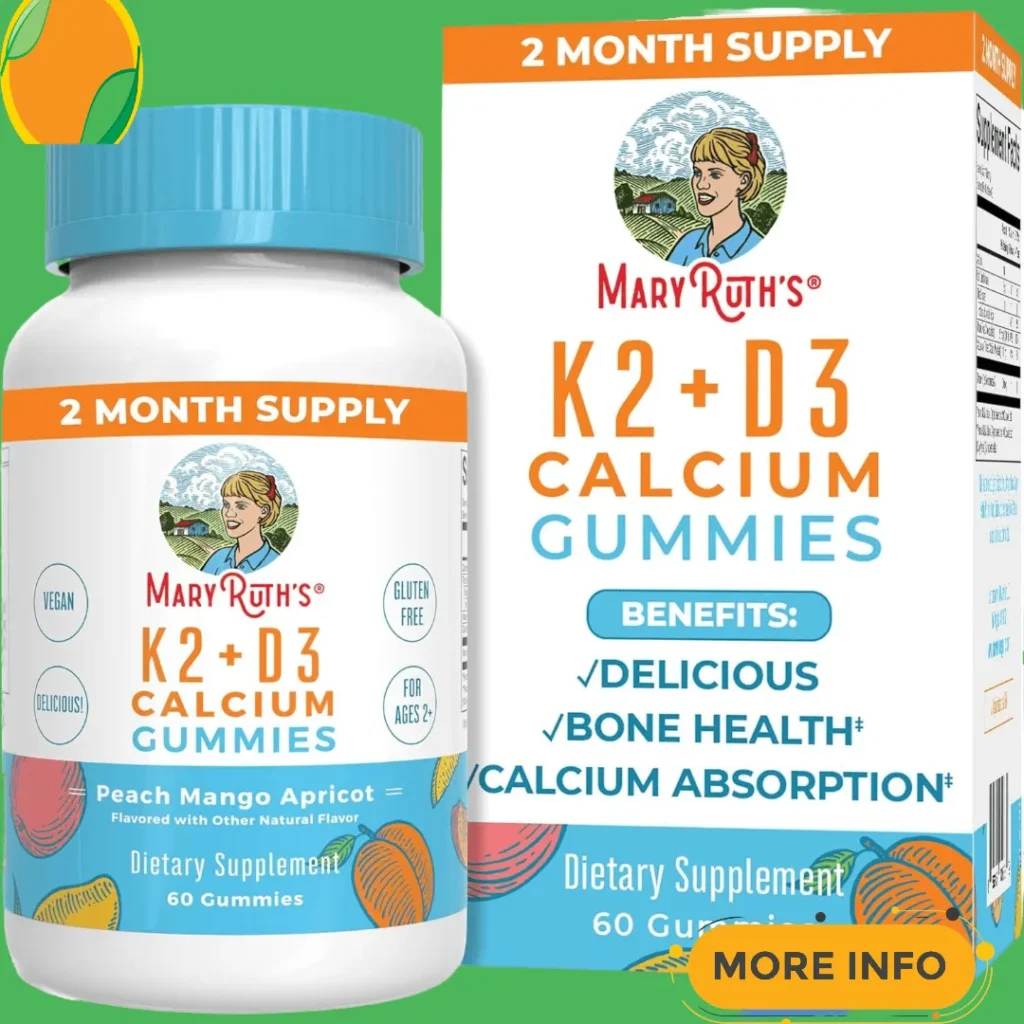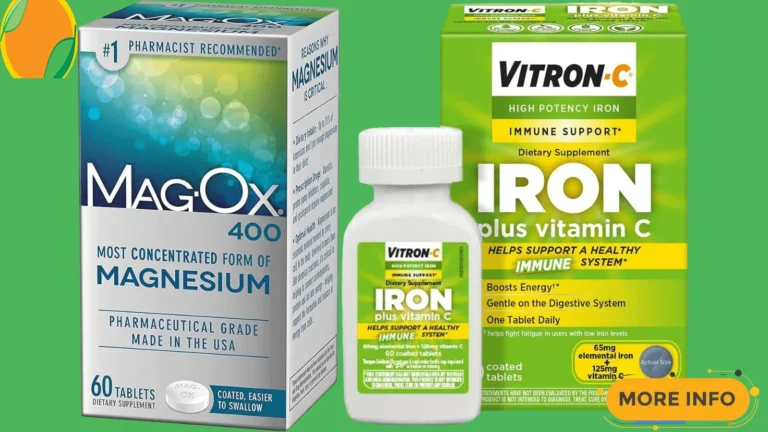Calcium Supplements for Kids
Imagine a childhood without the thrill of jumping on trampolines, climbing trees, or racing bikes down the neighborhood hill.
Strong bones are the foundation for all these beloved activities, and calcium plays a crucial role in building them.
However, ensuring that kids get enough calcium through diet alone can be challenging amidst picky eating habits and busy schedules.
This is where Calcium Supplements for Kids come into play as a convenient and effective solution to bridge nutritional gaps.
Parents often worry if their children are getting sufficient nutrients essential for growth and development.
With so much conflicting information available, understanding the importance of calcium supplements can feel overwhelming.
In this article, we’ll demystify the benefits of calcium supplements specifically designed for kids, diving into how they support healthy bone development, enhance overall health, and provide peace of mind to parents striving to nurture their child’s future well-being.
Calcium is an essential mineral for the growth and development of children, playing a crucial role in building strong bones and teeth.
While many kids can get sufficient calcium from their diet, some may need additional supplementation to meet their daily requirements.
In this article, we will explore the importance of calcium for kids, the recommended daily intake, and the benefits of calcium supplements for children.
We will also discuss the potential risks and side effects associated with taking calcium supplements at a young age, as well as provide tips on how to ensure your child is getting enough calcium through their diet.
With the help of expert recommendations and scientific research, we aim to provide parents and caregivers with valuable information to make informed decisions about incorporating calcium supplements into their child’s daily routine.
Whether your child is a picky eater, lactose intolerant, or simply not getting enough calcium from their diet, this article will guide you on how to support their bone health and overall well-being through the use of calcium supplements.
Table of Contents Calcium Supplements for Kids
Importance of calcium for children
Calcium plays a crucial role in the growth and development of children as it aids in the formation and maintenance of strong bones and teeth.
It is particularly vital during childhood and adolescence when bone growth is at its peak.
Adequate calcium intake not only ensures healthy skeletal development but also helps in the optimal functioning of muscles, nerves, and the heart.
Children who do not get enough calcium may be at risk of developing weak bones, which can lead to conditions like osteoporosis later in life.
Therefore, incorporating calcium-rich foods into a child’s diet from a young age is essential to support their overall health and well-being.
Choosing the right calcium supplement
When considering a calcium supplement for children, it is important to choose one that meets their specific nutritional needs to support healthy growth and development.
Look for supplements that are specifically formulated for children and contain a balanced combination of calcium and other essential nutrients like vitamin D, which aids in calcium absorption.
It is recommended to consult with a healthcare provider or a pediatrician before starting any calcium supplements to determine the appropriate dosage based on the child’s age, dietary intake, and any existing health conditions.
Additionally, opt for reputable brands that undergo rigorous testing and adhere to quality standards to ensure the safety and effectiveness of the supplement for children.
By selecting the right calcium supplement tailored to a child’s needs, parents can help promote optimal bone health and overall well-being in their growing child.
Benefits of calcium for kids
Calcium plays a vital role in supporting the overall health and development of children in various ways.
It is essential for building and maintaining strong bones and teeth, which are crucial for proper growth during childhood and adolescence.
Adequate calcium intake also contributes to muscle function and nerve transmission, supporting physical activity levels and overall mobility in children.
Furthermore, calcium is involved in blood clotting and maintaining a healthy heart rhythm, emphasizing its importance for cardiovascular health even at a young age.
Including calcium-rich foods in a child’s diet can help ensure they receive these benefits and support their overall health and well-being.
Recommended daily calcium intake for children
When considering the recommended daily calcium intake for children, it is important to recognize that the amount may vary based on age and developmental stage.
For infants aged 0-6 months, the recommended intake is 200 mg per day, increasing to 260 mg for infants aged 7-12 months.
Toddlers between 1-3 years old require approximately 700 mg of calcium daily, while children aged 4-8 years should aim for 1,000 mg per day.
As they enter adolescence between 9-18 years, the recommended intake rises to 1,300 mg per day to support their rapid growth and bone development during this critical period.
Ensuring children receive adequate calcium through a balanced diet is essential for their overall health and well-being.
Supporting children’s bone health
Ensuring optimal bone health in children is crucial for their growth and development.
Bones serve as the framework for the body and play a vital role in supporting muscles, protecting organs, and storing minerals.
In childhood, bones are continuously growing and strengthening, making it essential to provide the necessary nutrients to support this process.
Alongside calcium, Vitamin D is another key nutrient that plays a significant role in bone health as it aids in the absorption of calcium from the diet.
Additionally, engaging in weight-bearing physical activities like running, jumping, or dancing can further enhance bone strength and density in children.
By incorporating a balanced diet rich in calcium and Vitamin D, along with regular physical activity, parents can effectively support their children’s bone health and lay a solid foundation for their overall well-being in the long run.
Calcium-rich foods vs.
supplements
When considering the best approach to meeting children’s calcium needs, the debate between calcium-rich foods and supplements emerges.
While calcium-rich foods are essential for a well-rounded diet, providing a natural source of nutrients that support overall health, calcium supplements can be a convenient option to ensure an adequate intake, especially for picky eaters or individuals with dietary restrictions.
Calcium-rich foods like dairy products, leafy greens, and fortified foods offer additional nutrients important for growth and development, while supplements can offer a more concentrated dose of calcium.
However, it is important to note that supplements may lack the additional nutrients found in whole foods and should be used under the guidance of a healthcare provider to avoid exceeding recommended levels or potential interactions with other nutrients.
Ultimately, a combination of calcium-rich foods and supplements, when necessary, can help maintain optimal bone health in children.
Risks associated with calcium deficiency
Calcium is a fundamental mineral vital for numerous bodily functions, including bone development, nerve transmission, and muscle function.
Inadequate calcium intake can lead to various health risks, such as decreased bone density, a higher risk of fractures, and slower growth in children.
Insufficient calcium levels can also contribute to conditions like osteoporosis later in life.
Furthermore, calcium deficiency may lead to dental problems, muscle cramps, and a weakened immune system.
It is essential to maintain adequate calcium levels through a balanced diet to prevent these potential health complications associated with calcium deficiency.
Consulting a pediatrician for guidance
For parents seeking tailored advice regarding their child’s calcium intake and nutritional needs, consulting a pediatrician can provide invaluable guidance and recommendations.
A pediatrician can assess the individual requirements of a child based on factors such as age, gender, growth stage, and overall health status.
They can offer personalized suggestions on incorporating calcium-rich foods into a child’s diet, address any concerns about potential calcium deficiency, and provide insights on suitable supplementation if necessary.
By collaborating with a pediatrician, parents can ensure that their child receives the appropriate level of calcium to support optimal growth, bone health, and overall well-being.
In conclusion, ensuring adequate calcium intake is essential for children’s growth and development.
While calcium supplements can help bridge the gap for those falling short in their dietary intake, they should not replace a balanced diet rich in calcium-rich foods.
It is important to consult with a healthcare provider before starting any supplementation regimen for children, as excessive calcium intake can lead to health complications.
By incorporating a variety of calcium-rich foods and promoting healthy lifestyle habits, parents can support their children’s bone health and overall well-being.
FAQ
What are the benefits of giving calcium supplements to children?
Calcium supplements can help children develop strong bones and teeth, support healthy growth, and prevent conditions like osteoporosis later in life.
Adequate calcium intake is crucial during childhood when bones are still developing.
However, it’s important to consult with a healthcare provider before giving children calcium supplements to ensure they are getting the right amount for their age and needs.
How can parents determine if their child needs a calcium supplement?
Parents can determine if their child needs a calcium supplement by consulting with a pediatrician or healthcare provider.
Factors to consider include the child’s diet, age, growth patterns, and any existing medical conditions that may affect calcium absorption.
Blood tests or bone density scans may also be recommended to assess calcium levels.
Ultimately, a healthcare professional can provide guidance on whether a calcium supplement is necessary based on the child’s individual needs.
Are there any potential risks or side effects associated with giving children calcium supplements?
Yes, there are potential risks and side effects associated with giving children calcium supplements.
Excessive calcium intake may lead to hypercalcemia, causing symptoms like nausea, vomiting, constipation, and kidney stones.
Additionally, high doses of calcium supplements may interfere with the absorption of other essential minerals like iron and zinc.
It is important to consult with a healthcare provider before giving children calcium supplements to determine the appropriate dosage and ensure they are necessary for the child’s individual needs.
What are some good food sources of calcium that can help children meet their daily needs without supplements?
Some good food sources of calcium for children include dairy products like milk, cheese, and yogurt; fortified plant-based milk alternatives; dark leafy greens such as kale and spinach; tofu; almonds; and calcium-fortified foods like orange juice and cereals.
Encouraging children to consume a variety of these foods can help them meet their daily calcium needs without the need for supplements.
Additionally, incorporating calcium-rich foods into meals and snacks can make it easier for children to get the required amount of calcium for healthy growth and development.
How should parents choose a calcium supplement for their child, and how much should they give them?
Parents should choose a calcium supplement that is specifically formulated for children, with the appropriate dosage based on their age and weight.
It is important to consult with a pediatrician to determine the correct amount of calcium needed for their child’s individual dietary needs.
Typically, children between the ages of 1-3 require 700 mg of calcium per day, while children aged 4-8 need 1,000 mg per day.
It is essential to consider the child’s diet, any existing health conditions, and overall nutritional needs when selecting and dosing a calcium supplement.







